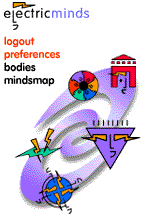
|

|

"I can't speak for Navajo people because I happen to be married to one," Jeremiah Cronin e-mailed me,"but I'm worried about the way computers and video games and satellite dishes corrupt traditions," he continued. I asked for examples. "I was asked to view a traditional Navajo rug that a grandma wanted to sell in To'Hajiilee Navajo Reservation," he replied. "She could understand English but couldn't speak it, so I brought my wife to communicate. Her family also does a lot of the Ganado style and Yei ei rugs so she wanted to check the quality of the weave. My Navajo language skills are minimal so I couldn't follow most of the conversation but my wife surprised me when she said that this was a valuable rug because the grandma had used wool from her own sheep (instead of yarn) and dyes from plants and berries. In the hogan with her was a son who had a 48 inch television which he was watching with grandchildren. They weren't interacting or using Navajo, just sitting there watching a soap opera. The grandma went back out to herd her sheep after we left. "My mother-in-law doesn't speak English or even understand it. Her skills are going to be lost because the subsequent generations don't consider this to be valuable knowledge. Her grandchildren (including our two girls) do not speak Navajo well enough to communicate with her. This is even more tragic because they will watch movies on the VCR or play computer games on our Powerbook instead if given the chance." Cronin cited another example that happened at a conference of educators: "There was a presentation about reintroducing Navajo language using a dancing feet hypercard program. The fellow who designed it was so proud (to the point of being boastful) and was speaking in a heavy German accent. All around me were Navajo educators who were saying that it really wasn't appropriate for him to be putting some of that material in the program. He had checked with a janitor (one person only) before proceding with publication." Cronin noted that he had seen computers used with great success, in a situation where he, as a teacher, had failed: "In my first year at Santa Fe Indian School I insisted that a 7th grade girl recite her multiplication tables in front of the class. She was from Jemez Pueblo which is one of the most conservative. She spoke her language fluently and spoke English fairly well. She simply would not answer my questions and would talk into her arm as she laid her head on the table. When I sent them to the old Apple lab to play Math Blaster, she could beat any other student in speed and accuracy. The computer didn't prompt her in front of a whole class and it didn't publicly humiliate her. I still regret making that mistake." My friend Buffy Sainte-Marie insists that access to the Internet can give kids on Indian reservations something they have always lacked: their own voice to the world. Schoolkids across America whose picture of Native Americans comes from movies and textbooks have an opportunity to interact with and get to know a student their own age who is not a member of a dead culture in a text book, but a living human. Surely, that empowerment has value. But does the empowerment that technology provides come with an expensive price where traditional cultures are concerned? All over the world, from Slovenia to Chiapas, the grandmothers talk in near-extinct languages while the grandkids watch Beverly Hills 90210 or play Super Nintendo. For a disabled kid in Oregon, like my friend Blaine Deatherage, the Net can be a lifeline. For a Tarahumara in the Mexican Sierra, it can be cultural poison. "What do we lose, and what do we gain?" is a good question to ask when new technologies are first deployed in societies. It's not too late to start asking it. |
librarybob said: I think it would be useful to distinguish between "innate ability" and "the result after many years of acculturation and schooling" to define "dumb". I wouldn't think it likely that there has been an innate (genetic) change, so that if people have indeed been dumbed down, it must be due to environmental causes. Actually, maybe "dumbed down" isn't quite right--maybe very committed to "low" and "mid" culture that really doesn't demand much thinking. A problem I see is that both of these are "ahistoric," living in the here and now with little sense of a past and little sense of a future. They lack a larger context. Most Active Topics: Topic 45 The Future of Families Topic 42 Library of Tomorrow: 20 Questions (game) | |||
Does the empowerment that technology provides come with an expensive price where traditional cultures are concerned? | ||||
Also in Howard Rheingold's Tomorrow: Collaborative Filtering excerpts from "What Will Be" Digital Maps: | ||||
|
|
|
electric minds |
virtual community center |
world wide jam |
edge tech |
tomorrow |
conversations
Any questions? We have answers.
©1996, 1997 electric minds, all rights reserved worldwide.
|
